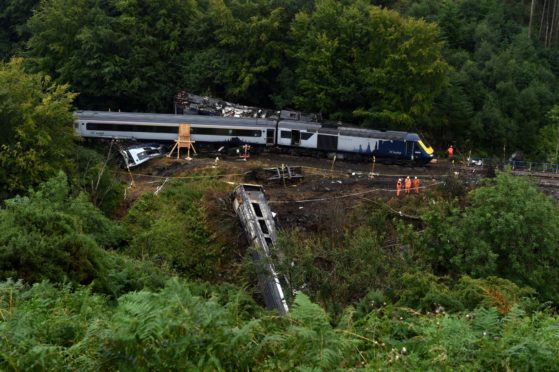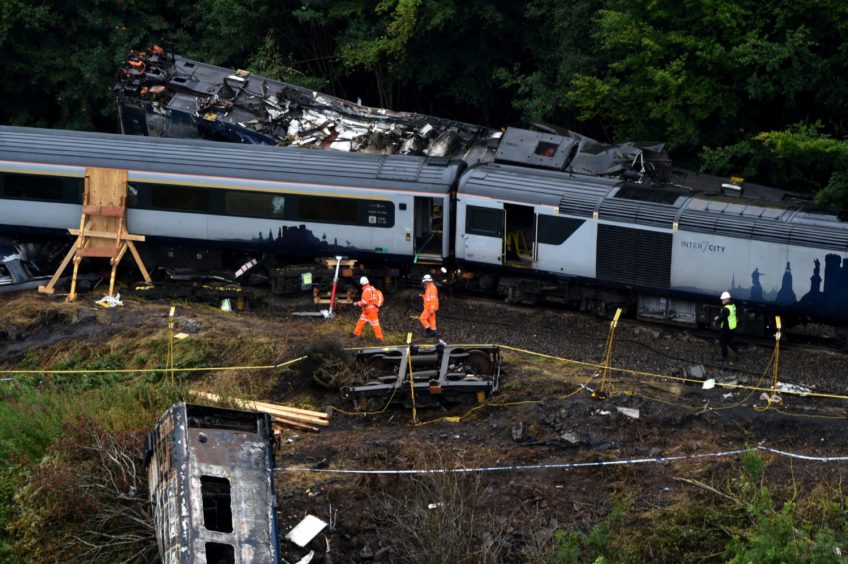Network Rail has a helicopter and engineers “ready to respond” as Scotland prepares for major rainfall this week, almost a year on after a landslip resulted in a fatal derailment near Stonehaven after a period of extreme weather.
Brett McCullough, Donald Dinnie and Chris Stuchbury died on August 12, 2020, after the 6.38am service from Aberdeen to Glasgow hit a landslip at Carmont.
On the day of the derailment, around 50mm, or 1.9 inches, of rain fell in the Carmont area between 5am and 9am during a period of intense thunderstorms that caused flooding throughout the north-east.
This week, the Met Office has issued yellow and amber weather warnings for thunderstorms and rainfall.
Network Rail says it will be closely monitoring conditions over the coming days.
‘We plan carefully ahead of forecast bad weather’
A spokesman said: “We plan carefully ahead of forecast bad weather using our specialist meteorologists to closely monitor conditions in advance and deploy specialist engineers to inspect our infrastructure ahead of the event.
“We will be monitoring the conditions over the coming days and will have engineers ready to respond to any issues while our helicopter will also be on-hand to inspect lines following significant poor weather.”
Network Rail’s Scotland-based helicopter inspection team was established in Spring last year, and has helped the organisation to “improve how we identify and respond to potential problems on the network”, and “speeds up the inspection process after extreme weather events”.
The spokesman highlighted that Network Rail is also making greater use of its weather modelling abilities and dedicated meteorologists to plan for major disruption.
Two reports were commissioned by Network Rail to help prevent similar tragedies in the future, and the organisation is currently rolling out recommendations from these reports across its network.
This includes a Weather Advisory Task Force headed by Professor Dame Julia Slingo on how best to understand and manage adverse and extreme weather events, and another by Lord Robert Mair on earthworks management.
Engineer believes Network Rail has ‘learned some hard lessons’
Gareth Dennis, a railway engineer and writer, said he is confident Network Rail has taken the lessons learned from the derailment so far seriously.
He said: “Extensive recommendations have been made covering both the way that we manage the physical infrastructure in extreme weather, but also in the way that we manage people and communications.
“Network Rail needs to show that it has taken these recommendations on board, but my experience is that it as an organisation that has learned some hard lessons and made changes as a result.”
Other disruption across the wider transport network
Traffic Scotland has warned of the forecast severe weather’s potential impact on travel, be it by train, car, ferry or plane, this week.
Douglas Cairns, operator manager at Traffic Scotland, advised travellers to prepare for the worst, and plan their journeys carefully.
He said: “The weather will bring difficult driving conditions, such as reduced visibility and surface water, and there is potential for disruption on other modes of transport.
“The Multi-Agency Response Team will be operational throughout the warning period to monitor conditions on the network.
“Our trunk road operating companies have started drainage inspections at known flooding hotspots and will continue to proactively monitor them, using specialist equipment where required.
“It’s important people plan their journeys before they set off and make sure their routes are available.
“The Traffic Scotland Twitter page is regularly updated and the mobile website – my.trafficscotland.org – lets people get the latest information on the move.
“If you are planning to travel by train, ferry or plane, please check with your operators to see if the conditions are having any impact on your services.”


